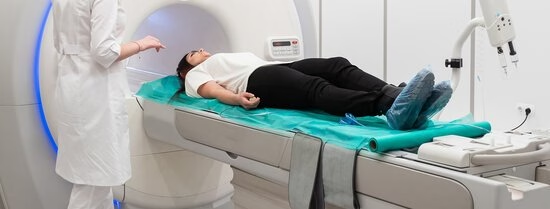The application of neuroscience has become an indispensable part of behavioural science. This interdisciplinary approach offers researchers new insights into the complex interactions between the brain, behaviour and the role of the environment. Using magnetic resonance imaging (MRI) techniques, scientists can observe brain activity while participants perform various tasks. As of November 2024, Erasmus University Rotterdam will start intensive collaboration with the Erasmus Medical Centre, and a new research-dedicated 3 Tesla MRI scanner will be used to conduct high-quality neuroscientific research.
A wide range of researchers will use the MRI scanner located at the Erasmus Medical Center, including those from the Erasmus School of Social and Behavioural Sciences (ESSB) and Rotterdam School of Management (RSM). Researchers use the scanner for both functional and structural brain research. Think of studying brain activity during cognitive tasks of making choices and analyzing brain structure about psychological factors, individual characteristics and skills Thanks to the collaboration between the various faculties and the Erasmus Medical Center, MRI scans are now more accessible to researchers. This lowers the threshold for conducting neurocognitive studies and increases the research capacity within Erasmus University.
Using fMRI to explore the complex relationship between brain and behaviour
Functional magnetic resonance imaging (fMRI) is an advanced technique that allows researchers to study brain activity during cognitive tasks, such as decision-making. While the structural MRI scanner mainly maps the grey and white matter in the brain, fMRI offers the possibility to observe in real-time which brain areas are active and how they communicate with each other. This technique stimulates collaboration between disciplines, including sociology, business administration, economics, psychology and neuroscience. This development fits perfectly with various research projects at Erasmus University that use fMRI to explore the complex relationship between brains and behaviour.
Watch the introduction video on the EUR MRI scanner.
Growing Up Together in Society (GUTS)
The consortium ‘Growing Up Together in Society (GUTS)’, led by Prof. Dr. Eveline Crone, is one of the projects that will use fMRI intensively. They investigate how young people develop and can grow up successfully within society. It focuses on social interactions, cognitive development and the role of environmental factors. Using fMRI and other methods, the researchers want to gain insight into the neural mechanisms behind future-oriented behaviour, rewards for self and others and social trust. The GUTS programme also has a second leg in the Erasmus Behavioural Lab, where EEG research is conducted.
fMRI at the Rotterdam School of Management
At the Erasmus Center for Neuroeconomics, led by Ale Smidts and Maarten Boksem, researchers study the choices people make and whether we can better understand these choices by studying how the brain is involved. One line of research focuses on the mental processes involved in the decision to engage in honest or dishonest behaviour and whether (dis)honesty can be identified as a character trait from the brain. Another line of research focuses on persuasion and influence: why are some messages (e.g., advertisements, government campaigns, or social media posts) so persuasive while others are not? Which mental processes play a role, and can these be pinpointed through brain research? A final line of research focuses on market prediction: recent research from the Centre shows that individuals find it very difficult to predict the market (e.g., which movie will become a blockbuster, which song will be a hit, which stocks will increase in value, etc.). However, brain activity from people viewing or listening to these movies, songs, or stocks in the scanner often can predict the market.
fMRI at the Erasmus School of Social and Behavioural Sciences
At the Erasmus School of Social and Behavioural Sciences, Suzanne van de Groep investigates the neural mechanisms behind prosocial behaviour and social connection in adolescents. Her research focuses on how giving, social context and brain activation influence developmental changes. In her upcoming neural synchrony project, she will study whether and how conversations between adolescents with contrasting perspectives promote empathy, connection and well-being by investigating synchronized brain activity.
Other researchers at the Erasmus School of Social and Behavioural Sciences, such as Janna Cousijn and Muhammet Sahan, will also use fMRI. In the Blowing Mind project, Cousijn investigates the similarities and differences in brain function and mental well-being between medicinal and recreational cannabis users. Sahan studies how we navigate through physical and psychological space (i.e. short-term and long-term memory) and how the brain supports these functions. With this research, he wants to learn more about the impact of digital devices such as GPS on the brain.
fMRI at Erasmus University makes research more accessible
'These new facilities are essential for us, allowing us easy access to the fMRI scanner at our university, hugely speeding up our research. But more importantly, it will provide an impulse for broader uptake of neuroscience methods at RSM and will attract more talented researchers to our university.’ says Maarten Boksem.
The new fMRI scanner now enables researchers to conduct large-scale experiments, which was previously only possible outside the regular opening hours of the Erasmus Medical Center. This change increases both the accessibility and the production of research. For Growing Up Together in Society alone, no fewer than 800 participants will be examined with fMRI in the coming years. Because the scanner, which is shared with Generation R, is research-dedicated, there is room for new research. Eveline Crone says: “It is fantastic that researchers now have easy access to the fMRI scanner. Many researchers wanted this, and now, with the support of the Executive Board, it is going to happen.”
- More information
Marjolein Kooistra, communications & press ESSB + 31683676038 kooistra@essb.eur.nl

